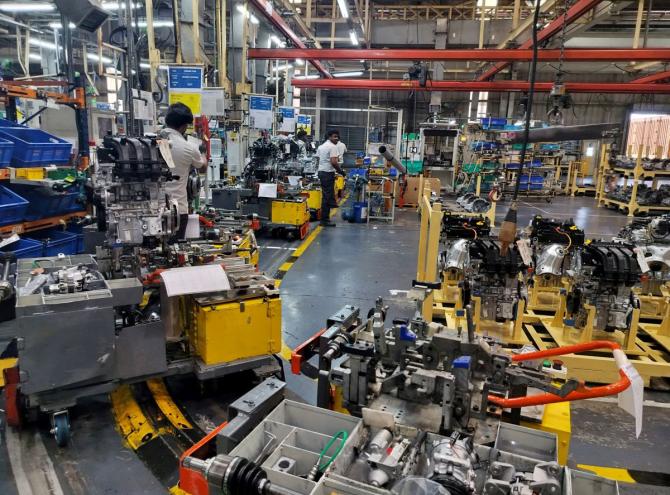'India needs many more job creators, both in manufacturing and services, to make it big.'
'For that, the red carpet must be rolled out fully and for all investors without holding back,' suggests Nivedita Mookerji.

If a top global brand such as Apple can mean record employment generation in India, the idea of 'red carpet' replacing 'red tape' must be pursued with much greater vigour.
Estimates suggest the creation of at least 150,000 direct jobs from the manufacturing of Apple products in India ever since the production-linked incentive (PLI) scheme was introduced in August 2021.
The Cupertino-based company's ecosystem is a leading blue-collar job generator in India.
The number surpasses the jobs created by any private conglomerate or public-sector enterprise within the country in such a short span of time.
Indeed, the transition from 'red tape' to 'red carpet' was an integral part of the election campaign launched by the Bharatiya Janata Party -- at that point the main Opposition party -- exactly 10 years ago.
The world took notice as the narrative about rolling out the proverbial red carpet for foreign investors played out in multiple political rallies in 2014.
After winning the 2014 Lok Sabha elections and then again in 2019, the overwhelming theme of the BJP clearly turned to all things Indian, ranging from 'Make in India' to 'Buy in India' and 'Travel in India'.
Even so, the job-creation story linked to Apple suggests that the 'red carpet' has been around in some ways, though not evenly spread for global investors across sectors.
Narendra Modi, who as the prime ministerial candidate for the BJP in 2014, was the force behind the red carpet theory, earlier this year reiterated the same philosophy at the Uttar Pradesh global investors' summit.
The prime ,inister said in February red tape culture had been replaced with red carpet culture in the seven years of the "double-engine" government in Uttar Pradesh.
Last year too in a virtual G20 trade and investment ministerial meeting, Mr Modi walked the red carpet path.
His message to the global community was that India had moved from red tape to red carpet and had enabled 'unfettered foreign direct investment inflows' into the country since 2014.
In the same meeting, he also spoke about how 'Make in India' and 'Aatmanirbhar Bharat' had pushed manufacturing while urging the G20 members to build an inclusive global value chain to withstand future shocks
Manufacturing Apple products and thereby creating jobs may well be a result of combining a red carpet welcome for foreign investors with incentives for 'Make in India'.
But this template may not work in all cases.
For the red carpet to yield real results, especially in generating quality jobs, easing of foreign investment rules across sectors without any caveats should be the way to go.
As India steps up its manufacturing to the next level and moves aggressively into areas such as electric vehicles, renewable energy, semiconductors, and high-end communication devices, policymakers must explore a no-holds-barred FDI policy.
The idea should be to usher in multinationals without getting into complicated domestic sourcing.
As recent examples have shown, companies in India need to enter partnerships to take up semiconductor device manufacturing because of the technical knowhow involved in the process.
The Tata Group, which is in a joint venture with Taiwan's Powerchip Semiconductor Manufacturing Corporation, is expected to start producing semicon chips by the end of 2026.
Semicon devices are typically built in nanofabrication processes, which are performed on the surface of substrates made from pure single crystal silicon.
Taiwan, which had an early start in the industry after Radio Corporation of America, a dominant electronics company in the US back in the 1970s, was convinced to transfer semiconductor technology to the country, remains the biggest in the area.
Taiwan Semiconductor Manufacturing Company commands at least half the global market share in semicon chip manufacturing.
Again, in the case of renewables, India can't do without partnerships and alliances.
China, for example, dominates in the production of solar panels and their components, including solar cells, with 75 to 80 per cent of global output coming from that country alone, according to International Energy Agency data.
At a time when India's focus on renewables is going up, it's not surprising therefore that a recent report of the United Nations Conference on Trade and Development said India's trade dependence on China and the European Union increased 1.2 per cent each in 2023. But that's not enough.
The numbers must go up much more, whether it's trade with Taiwan, China, or any other country, and whether it's for EVs, solar panels, semicon chips, or mobile phones.
Apple waited for years in search of an easier regulatory environment in India before its ecosystem turned out to be a top job creator.
India needs many more job creators, both in manufacturing and services, to make it big.
For that, the red carpet must be rolled out fully and for all investors without holding back.
Feature Presentation: Aslam Hunani/Rediff.com












 © 2025
© 2025